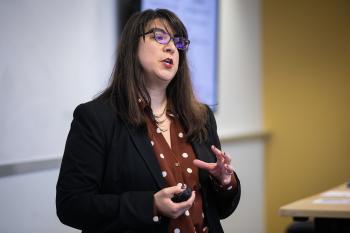Oct 24
2019
ASU Student Uses Accelerator To Launch Healthcare Program To Supports At-Risk Individuals
By Ramona Ramadas, Arizona State University graduate student — utilizing the resources provided by the HEALab, she launched New Trails Navigators.

Over the past decade, technology and its applications continue to impact and advance our everyday lives, from things like smartwatch wearables that track our daily activity and wake us up in the morning to 3-D printing of medical models and virtual reality innovations that have the capacity to accurately replicate an automated surgery environment.
Similarly, ASU Online has brought new technology and resources to students like myself pursuing health and health care-related degrees to encourage innovative approaches to coursework and career paths. One of the most impactful resources I’ve seen available to the student community is the Health Entrepreneurship Accelerator Lab (HEALab).
The accelerator, which provides networking, idea-generation support, pitch competitions and proposal prep assistance launched in September 2017 as a health innovation entrepreneurship lab for Arizona State University (ASU) students, faculty – both online and on campus, and the community to cultivate disruptive healthcare solutions. It is a collaborative effort with academic units and the Office of Entrepreneurship and Innovation with the goal of educating health-focused leaders to navigate the accelerating disruptions in healthcare and create new solutions to real-world problems.
As a recent Master of Healthcare Innovation (MHI) graduate, I have been able to leverage HEALab to kick start my peer health program, New Trails Navigators. The award-winning care transformation program I’ve created focuses on serving individuals who struggle to get the personalized care they need due to homelessness, incarceration, addiction or lack of insurance. The program connects at-risk individuals with peer health navigators who are uniquely qualified to re-direct them toward sustainable health and wellness.
The peer health navigators can relate in a way that other support service representatives can’t because they have been in an at-risk situation, themselves. This relatability allows the navigators to connect, build trust and positively impact the individual’s situation. Today, the program is supported by a learning management system that delivers our whole-person peer training. This training is unlike any other peer support program in place today, as an app-based platform allows peers and patients to interact in a variety of ways, ensuring that the patient is supported where they live, work, and play. Over time, artificial intelligence will become a part of the program delivery.